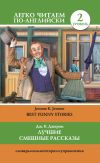Текст книги "Смешные рассказы / The Funny Stories"

Автор книги: Марк Твен
Жанр: Иностранные языки, Наука и Образование
Возрастные ограничения: +12
сообщить о неприемлемом содержимом
Текущая страница: 1 (всего у книги 6 страниц) [доступный отрывок для чтения: 1 страниц]
Марк Твен / Mark Twain
Смешные рассказы / The Funny Stories
Адаптация текста, комментарии и словарь О. Н. Прокофьевой
© Прокофьева О. Н., адаптация текста, комм. и словарь
© ООО «Издательство АСТ»
How to Cure a Cold
It is a good thing, perhaps, to write for the amusement of the public, but it is a far higher and nobler thing to write for their instruction – their profit – their actual benefit. It is the only object of this article.
If it helps to restore the health of one sufferer among my race, to bring back to his dead heart again the quick, generous impulses of other days, I shall be rewarded for my work.
Having led a pure and blameless life, I believe that no man who knows me will reject the suggestions I am about to make, out of fear that I am trying to deceive him.
Let the public do itself the honor to read my experience in curing a cold and then follow in my footsteps.
When the White House was burned in Virginia, I lost my home, my happiness, my constitution and my trunk.
The loss of the two first named articles was a matter of no great consequence, since a home without a mother or a sister, or a distant young female relative in it, who remind you that there are those who think about you and care for you, is easily obtained.
And I did not care about the loss of my happiness. I was not a poet, and it could not be possible that melancholy would stay with me long.
But to lose a good constitution and a better trunk were serious misfortunes.
On the day of the fire, my constitution succumbed to a severe cold.
The first time I began to sneeze, a friend told me to go and bathe my feet in hot water and go to bed.
I did so.
Shortly afterward, another friend advised me to get up and take a cold shower-bath. I did that also.
Within the hour, another friend told me that I had to “feed a cold and starve a fever.”
I had both.
I decided to fill myself up for the cold, and then let the fever starve a while.
I ate pretty heartily; once I went to a stranger who had just opened his restaurant that morning. He waited near me in respectful silence until I had finished feeding my cold, when he asked if the people in Virginia were much afflicted with colds?
I told him I thought they were.
He then went out and took in his sign.[1]1
He then went out and took in his sign. – Тогда он вышел на улицу и снял вывеску.
[Закрыть]
I started down toward the office, and on the way met another friend, who told me that a quart of salt water, taken warm, would cure a cold in no time.
I hardly had room for it, but I tried it anyhow.
The result was surprising; I must have vomited three-quarters of an hour; I believe I threw up my immortal soul.
I believe, warm salt water may be a good enough remedy, but I think it is too severe. If I had another cold, and there was no way out but to take either an earthquake or a quart of warm salt water, I would be glad to choose the earthquake.
After the storm in my stomach I went back to handkerchiefs, as had been my custom in the early stages of my cold, until I came across a lady who said she had lived in a part of the country where doctors were scarce and had from necessity learnt to treat simple “family complaints.”
I knew she must have had much experience, for she seemed to be a hundred and fifty years old.
She mixed a variety of drugs and instructed me to take a wine glass full of it every fifteen minutes.
I never took but one dose; that was enough.
Under its influence, my brain showed miracles of meanness, but my hands were too weak to execute them. Like most other people, I often feel mean, and act so, but until I took that medicine I had never felt proud of it.
At the end of two days, I was ready to go to curing again. I took a few more remedies, and finally drove my cold from my head to my lungs.
I got to coughing, and my voice fell below Zero. I spoke in a thundering bass two octaves below my natural tone.
My case grew more and more serious every day.
Plain gin was recommended; I took it.
Then gin and molasses; I took that also.
Then gin and onions; I added the onions and took all three.
I detected no particular result, however, except that I had acquired a breath like a buzzard’s.
I understood I had to travel for my health. I went to Lake Bigler with my comrade reporter, Adair Wilson. My friend took all his baggage with him, consisting of two excellent silk handkerchiefs and his grandmother.
I had my regular gin and onions along.
We sailed and hunted and fished and danced all day, and I treated my cough all night.
But my disease continued to grow worse. A sheet-bath was recommended. I had never refused a remedy yet, and it seemed poor policy[2]2
poor policy – зд. плохое решение
[Закрыть] to start then.
It was done at midnight, and the weather was very frosty. My breast and back were bared, and a sheet (there appeared to be a thousand yards of it) soaked in ice-water was put all around me.
When the chilly rag touches one’s warm flesh, it makes him feel sudden violence and gasp for breath just as men do in the death agony. It stopped the beating of my heart. I thought my time had come.
Never take a sheet-bath – never.
When the sheet-bath failed to cure my cough, a lady friend recommended the application of a mustard plaster to my breast.
I believe that would have cured me, if it had not been for young Wilson.[3]3
I believe that would have cured me, if it had not been for young Wilson. – Думаю, меня бы это вылечило, если бы не мой друг Уилсон.
[Закрыть]
When I went to bed, I put my mustard plaster – which was an eighteen-inch square – where I could reach it when I was ready for it.
But young Wilson got hungry at night, and ate it up.
I never saw anybody have such an appetite; I am confident that he would have eaten me if I had been healthy.
After a week at Lake Bigler, I went to Steamboat Springs, and besides the steam baths, I took a lot of the worst medicines ever created. They would have cured me, but I had to go back to Virginia, where, in spite of the variety of new remedies I took every day, I managed to aggravate my disease.
I finally went to San Francisco, and the first day I got here one lady told me to drink a quart of whisky every twenty-four hours, and a friend recommended precisely the same.
Each advised me to take a quart – that makes half a gallon. I plan to do it or perish in the attempt.
Now, with the kindest motives in the world, I offer for the consideration of patients the course of treatment I have lately gone through. Let them try it – if it doesn’t cure them, it can’t more than kill them.
The McWilliamses And The Burglar Alarm
The conversation went smoothly and pleasantly from weather to crops, from crops to literature, from literature to scandal, from scandal to religion; then took a random jump, and landed on the subject of burglar alarms. And now for the first time Mr. McWilliams showed feeling. Whenever I notice this sign on this man’s face, I understand it, and keep silence, and give him opportunity to unload his heart.
“I do not spend one single cent on burglar alarms, Mr. Twain – not a single cent – and I will tell you why. When we were finishing our house, we found we had a little cash left over. And Mrs. McWilliams said, let’s have a burglar alarm. I agreed. Very well: the man came up from New York and put in the alarm, and charged three hundred and twenty-five dollars for it, and said we could sleep without uneasiness now. So we did for a while – say a month. Then one night we smelled smoke, and I was told to get up and see what the matter was. I lit a candle, and went to the stairs, and met a burglar coming out of a room with a basket of tinware, which he had mistaken for solid silver in the dark.
“He was smoking a pipe. I said, ‘My friend, we do not allow smoking in this room.’ He said he was a stranger, and could not be expected to know the rules of the house. He said he had been in many houses just as good as this one, and it had never been a problem before. He added that usually such rules had never been considered to apply to burglars, anyway.
“I said: ‘Smoke along, then, if it is the custom, though I think that giving a burglar the privilege which is denied to a bishop is a sign of the looseness of the times. But what business do you have in this house, why have you entered it without ringing the burglar alarm?’
“He looked confused and ashamed, and said, with embarrassment: ‘I beg a thousand pardons. I did not know you had a burglar alarm, or I would have rung it. I beg you not to mention where my parents may hear of it, for they are old and feeble, and such a breach of the conventionalities of our Christian civilization might disappoint them and affect their health. May I trouble you for a match?’
“I said: ‘Here you are. But to return to business: how did you get in here?’
“’Through a window on the second floor.’
“It was even so. I redeemed the tinware at pawnbroker’s rates, bade the burglar good-night, closed the window after him, and retired to headquarters to report. Next morning we sent for the burglar-alarm man, and he came up and explained that the reason the alarm did not ‘go off’ was that no part of the house but the first floor was attached to the alarm. This was simply idiotic; one might as well have no armor on at all but for on his legs. The expert now put the whole second story on the alarm, charged three hundred dollars for it, and went his way. By and by, one night, I found a burglar in the third story, about to go down a ladder with a lot of miscellaneous property. My first impulse was to crack his head with a billiard cue; but I refrained, and proceeded to compromise. I redeemed the property at the familiar rates, after charging ten per cent for use of my ladder. Next day we sent down for the expert once more, and had the third story attached to the alarm, for three hundred dollars.
“By this time the ‘annunciator’ had grown to formidable dimensions. It had forty-seven tags on it, marked with the names of the various rooms and chimneys, and it occupied the space of an ordinary wardrobe. The gong was the size of a washbowl, and was placed above the head of our bed. There was a wire from the house to the coachman’s room in the stable, and a noble gong alongside his pillow.
“We should have been comfortable now but for one defect. Every morning at five the cook opened the kitchen door, and rip went that gong! The first time this happened I thought the last day had come. I didn’t think it in bed – no, but out of it – for the first effect of that frightful gong is to hurl you across the house, and slam you against the wall, and then curl you up like a spider on a stove lid, till somebody closes the kitchen door. Well, this catastrophe happened every morning regularly at five o’clock, and lost us three hours sleep.
“Well, we were gradually fading toward a better land, on account of the daily loss of sleep; so we finally had the expert up again. He ran a wire to the outside of the door, and placed a switch there, where Thomas, the butler, always made one little mistake – he switched the alarm off at night when he went to bed, and switched it on again at daybreak in the morning, just in time for the cook to open the kitchen door, and let that gong slam us across the house, sometimes breaking a window with one or the other of us. At the end of a week we recognized that this switch business was a snare. We also discovered that a band of burglars had been living in the house the whole time – not to steal, for there wasn’t much left now, but to hide from the police. They decided that the detectives would never think of a tribe of burglars taking sanctuary in a house notoriously protected by the most elaborate burglar alarm in America.
“Sent down for the expert again, and this time he struck a most dazzling idea – he fixed the thing so that opening the kitchen door would take off the alarm. It was a noble idea, and he charged accordingly. But you already foresee the result. I switched on the alarm every night at bed-time, no longer trusting on Thomas’s memory; and as soon as the lights were out the burglars walked in at the kitchen door, thus taking the alarm off without waiting for the cook to do it in the morning. For months we couldn’t have any company. Not a spare bed in the house; all occupied by burglars.
“Finally, I got up a cure of my own. The expert answered the call, and ran another wire to the stable, and established a switch there, so that the coachman could put on and take off the alarm. That worked first rate, and we even got to inviting company once more and enjoying life.
“But one winter night we were flung out of bed by the sudden music of that awful gong, and when we ran to the annunciator and saw the word ‘Nursery’ exposed, Mrs. McWilliams fainted, and I was close to it myself. I seized my shotgun, and stood waiting for the coachman. I knew that his gong had flung him out, too, and that he would be along with his gun as soon as he could jump into his clothes. When I judged that he was ready, I crept to the room next the nursery, looked through the window, and saw the coachman in the yard below. Then I hopped into the nursery and fired, and in the same instant the coachman fired at the red flash of my gun. Both of us were successful; I crippled a nurse, and he shot off all my back hair. We telephoned for a surgeon. There was not a sign of a burglar, and no window had been raised. One glass was absent, but that was where the coachman’s charge had come through. Here was a fine mystery – a burglar alarm ‘going off’ at midnight of its own accord, and not a burglar in the neighborhood!
“The expert answered the usual call, and explained that it was a ‘False alarm.’ Said it was easily fixed.
“What we suffered from false alarms for the next three years. During the next three months I always flew with my gun to the room indicated, and the coachman was always ready to support me. But there was never anything to shoot at – windows all tight and secure. We always sent down for the expert next day, and he fixed those particular windows so they would keep quiet a week or so, and always remembered to send us a bill.
“After we had answered three or four hundred false alarms, we stopped answering them. Yes, I simply rose up calmly, when slammed across the house by the alarm, calmly inspected the annunciator, took note of the room indicated; and then calmly disconnected that room from the alarm, and went back to bed as if nothing had happened. Moreover, I did not send for the expert. Well, it goes without saying that in the course of time all the rooms were taken off, and the entire machine was out of service.
“It was at this unprotected time that the burglars walked in one night and carried off the burglar alarm! yes, sir, ripped it out, springs, bells, gongs, battery, and all; they took a hundred and fifty miles of copper wire; they just cleaned it out.
“We got it back, we accomplished it finally, for money. The alarm firm said that what we needed now was to have her put in right – with their new springs in the windows to make false alarms impossible, and their new clock attached to take off and put on the alarm morning and night without human assistance. That seemed a good scheme. They promised to have the whole thing finished in ten days. They began work, and we left for the summer. They worked a couple of days; then they left for the summer. After which the burglars moved in, and began their summer vacation. When we returned in the fall, the house was empty. We refurnished, and then sent down to hurry up the expert. He came up and finished the job, and said: ‘Now this clock is set to put on the alarm every night at 10, and take it off every morning at 5:45. All you’ve got to do is to wind her up every week, and then leave her alone – she will take care of the alarm herself.’
“After that we had a most tranquil season during three months. The bill was impressive, of course, and I had said I would not pay it until the new machinery had proved itself to be flawless. The time set was three months. So I paid the bill, and the very next day the alarm went to buzzing like ten thousand bee swarms at ten o’clock in the morning. I turned the hands around twelve hours, according to instructions, and this took off the alarm. But it happened again at night, and I had to set it ahead twelve hours once more to get it to put the alarm on again. That sort of nonsense went on a week or two, then the expert came up and put in a new clock. He came up every three months during the next three years, and put in a new clock. But it was always a failure. His clocks all had the same defect: they would put the alarm on in the daytime, and they would not put it on at night; and if you forced it on yourself, they would take it off again the minute your back was turned.
“Now there is the history of that burglar alarm – everything just as it happened. Yes, sir, and when I had slept nine years with burglars, and maintained an expensive burglar alarm the whole time, for their protection, not mine, I just said to Mrs. McWilliams that I had had enough; so with her full consent I took the whole thing out and traded it off for a dog, and shot the dog. I don’t know what you think about it, Mr. Twain; but I think those things are made solely in the interest of the burglars. Good-bye: I get off here.”
To Raise Poultry
[Being a letter written to a Poultry Society that had conferred a complimentary membership upon the author.]
Seriously, from early youth I have taken a special interest in the subject of poultry-raising, and so this membership touches me. Even as a schoolboy, poultry-raising was a study with me, and I may say that as early as the age of seventeen I was acquainted with all the best and quickest methods of raising chickens, from raising them by burning matches under their noses, down to lifting them off a fence on a frosty night by putting the end of a warm board under their heels. By the time I was twenty years old, I really suppose I had raised more poultry than any one individual in all the section round about there. The very chickens came to know my talent by and by. The youth of both sexes stopped to paw the earth for worms, and old roosters stopped to crow, when I passed by.
I have had so much experience in the raising of fowls that I cannot but think that a few hints from me might be useful to the society. The two methods I have already touched upon are very simple, and are only used in the raising of the commonest class of fowls; one is for summer, the other for winter.
In the one case you start out with a friend along about eleven o’clock’ on a summer’s night (not later, because in some states – especially in California and Oregon – chickens always wake up just at midnight and crow from ten to thirty minutes, according to the ease or difficulty they experience in getting the public waked up), and your friend carries with him a sack. Arrived at the henroost (your neighbor’s, not your own), you light a match and hold it under first one and then another bird’s nose until they are willing to go into that bag without making any trouble about it. You then return home, either taking the bag with you or leaving it behind, according to the circumstances. N. B. – I have seen the time when it was appropriate to leave the sack behind and walk off with considerable velocity, without ever leaving any word where to send it.
In the case of the other method mentioned for raising poultry, your friend takes along a covered vessel with a charcoal fire in it, and you carry a long slender plank. This is a frosty night, understand. Arrived at the tree, or fence, or other henroost (your own if you are an idiot), you warm the end of your plank in your friend’s fire vessel, and then raise it and ease it up gently against a sleeping chicken’s foot. If the subject of your attention is a true bird, he will return thanks with a sleepy cluck or two.
The Black Spanish is an exceedingly fine bird and a costly one. Thirty-five dollars is the usual figure, and fifty is not an uncommon price for a specimen. Even its eggs are worth from a dollar to a dollar and a half apiece. The best way to raise the Black Spanish fowl is to go late in the evening and raise coop and all. The reason I recommend this method is that, the birds being so valuable, the owners do not permit them to roost around promiscuously, they put them in a coop as strong as a fireproof safe and keep it in the kitchen at night. The method I speak of is not always a bright and satisfying success, and yet there are so many little articles of interest about a kitchen, that if you fail on the coop you can generally bring away something else. I brought away a nice steel trap one night, worth ninety cents.
But what is the use in my pouring out my whole intellect on this subject? I have shown the Western New York Poultry Society that they have taken to their bosom[4]4
have taken to their bosom – они пригрели
[Закрыть] a member who is not a chicken by any means, but a man who knows all about poultry, and is just as high up in the most efficient methods of raising it as the president of the institution himself. I thank these gentlemen for the honorary membership they have conferred upon me, and shall stand at all times ready and willing to testify my good feeling by deeds as well as by this hastily written advice and information. Whenever they are ready to go to raising poultry, let them call for me any evening after eleven o’clock.
Внимание! Это не конец книги.
Если начало книги вам понравилось, то полную версию можно приобрести у нашего партнёра - распространителя легального контента. Поддержите автора!








































